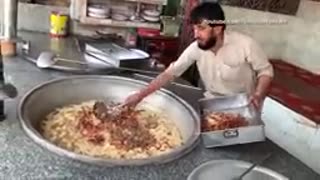Premium Only Content

Food Handler Training Course_ Part 2
### **Food Handler Training Course (Part 2) – Personal Hygiene and Health**
Maintaining personal hygiene and good health is essential for food handlers to prevent contamination and ensure food safety. Poor hygiene practices can introduce harmful bacteria, viruses, and allergens into food, leading to serious consequences for consumers.
---
### **Objectives of Part 2**
1. Understand the importance of personal hygiene in food safety.
2. Learn proper hygiene practices for food handlers.
3. Recognize when to stay away from food preparation due to illness.
---
### **Why Personal Hygiene is Critical**
1. **Prevents Contamination:**
- Hands, hair, skin, and clothing can carry harmful microorganisms that contaminate food.
2. **Protects Consumers:**
- Maintaining cleanliness helps reduce the risk of foodborne illnesses.
3. **Legal Compliance:**
- Many local food safety regulations require strict adherence to personal hygiene standards.
---
### **Key Personal Hygiene Practices**
#### **1. Hand Hygiene**
Proper handwashing is the most critical step in preventing the spread of germs. Follow these steps:
1. **Wet hands** with warm running water.
2. **Apply soap** and lather for at least **20 seconds**, scrubbing all parts of the hands, including nails and between fingers.
3. **Rinse thoroughly** under running water.
4. **Dry hands** with a disposable towel or air dryer.
**When to Wash Hands:**
- Before starting work or handling food.
- After using the restroom.
- After handling raw meat, poultry, seafood, or eggs.
- After touching your face, sneezing, or coughing.
- After cleaning, handling trash, or using chemicals.
#### **2. Wear Clean Clothing**
- Always wear clean and suitable work clothing, including aprons or uniforms.
- Avoid wearing jewelry (especially rings and bracelets) as they can trap bacteria or fall into food.
#### **3. Hair Restraint**
- Keep hair tied back and wear a hairnet, cap, or other restraint to prevent hair from falling into food.
#### **4. Fingernails**
- Keep nails short, clean, and free from nail polish or artificial nails, as these can harbor bacteria.
#### **5. Avoid Touching the Face**
- Avoid touching your nose, mouth, or hair while handling food to prevent contamination.
#### **6. Use Gloves Properly**
- Wear gloves when handling ready-to-eat foods, but remember they are not a substitute for handwashing.
- Change gloves when they become dirty, torn, or after handling raw food.
---
### **Health and Illness in Food Handling**
#### **1. When Not to Handle Food**
Food handlers should avoid working with food if they are experiencing:
- Diarrhea or vomiting.
- Fever, sore throat, or coughing.
- Open wounds or skin infections on hands or arms.
- Symptoms of contagious illnesses such as Norovirus, Hepatitis A, or Salmonella.
#### **2. Reporting Illness**
- Notify a supervisor immediately if you are unwell or suspect you may have a foodborne illness.
- Follow local health department guidelines regarding when you can return to work.
#### **3. Cover Cuts and Wounds**
- Use waterproof bandages to cover cuts or wounds.
- Wear gloves over bandaged hands to prevent contamination.
---
### **Hygiene Checklist for Food Handlers**
- Wash hands frequently and correctly.
- Wear clean, appropriate clothing and hair restraints.
- Avoid working while sick or injured.
- Maintain good habits, such as not eating, drinking, or smoking in food preparation areas.
- Cover all cuts, wounds, and sores properly.
---
### **Common Mistakes to Avoid**
1. **Not Washing Hands Regularly:**
- Failing to wash hands at the right times is one of the leading causes of foodborne illness outbreaks.
2. **Improper Use of Gloves:**
- Reusing gloves or not changing them between tasks can spread contamination.
3. **Working While Sick:**
- Ignoring symptoms of illness and continuing to work can endanger consumers.
4. **Touching Food with Bare Hands:**
- Avoid bare-hand contact with ready-to-eat foods to minimize contamination risks.
---
### **Tips for Success**
- Establish a clear hygiene policy for all food handlers.
- Provide ongoing training and visual reminders about hygiene practices.
- Conduct regular checks to ensure compliance with personal hygiene standards.
---
### **Conclusion**
Good personal hygiene is the first step in ensuring food safety. By maintaining cleanliness and staying alert to health conditions, food handlers can protect consumers and uphold the highest food safety standards.
---
Would you like to move on to **Part 3: Preventing Cross-Contamination**, or is there a specific topic you'd like more information on?
-
 20:24
20:24
HSESafetyInformation
7 months agoKABULI PULAO RECIPE - Original 40+ KG Afghani Meat Pulau Prepared - Street Food Qabili Plav Recipe_2
35 -
 LIVE
LIVE
GritsGG
5 hours agoWarzone Win Grinding! Most Wins in WORLD! 3680+!
151 watching -
 55:45
55:45
Tactical Advisor
4 hours agoNew Product Alert! | Vault Room Live Stream 040
44.6K4 -
 3:30:37
3:30:37
Reidboyy
4 hours ago $1.33 earnedTHEY GOT RID OF SBMM WTF!?!? (Go Phillies)
19.2K -
 LIVE
LIVE
The Company Boyz
3 hours agoDying Light: The Beast | Ja Pierdole, Kurwa Bober!
66 watching -
![Mr & Mrs X - Feminism, Family, Federal Reserve, The Rise Of The [DS] Agenda](https://1a-1791.com/video/fwe2/12/s8/1/6/F/R/n/6FRnz.0kob-small-Mr-and-Mrs-X-Feminism-Famil.jpg) 58:10
58:10
X22 Report
11 hours agoMr & Mrs X - Feminism, Family, Federal Reserve, The Rise Of The [DS] Agenda
198K53 -
 16:37
16:37
Robbi On The Record
1 day ago $8.85 earnedThe Theater of Manufactured Outrage - When Left and Right Dance for the Same Puppet Master
49.5K50 -
 31:27
31:27
Stephen Gardner
23 hours ago🔥BOMBSHELL: Mortician EXPOSES Charlie Kirk Autopsy - The Key Evidence EVERYONE Missed!
141K303 -
 30:00
30:00
BEK TV
3 days agoGUT HEALTH AND THE POWER OF KIMCHI WITH KIM BRIGHT ON TRENT ON THE LOOS
66.7K6 -
 11:02:52
11:02:52
IamNibz
13 hours ago $3.07 earned6-7 Minecraft Stream
36K6
